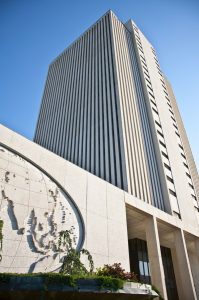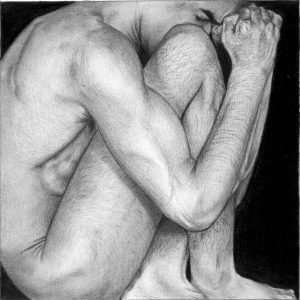Those who have followed my posts here might know that I have had the benefit of a long and slow faith crisis… spread out over 20 years, since the beginning of High School to my recent decision to stop participating in the church for the foreseeable future.
Though certainly unorthodox by most standards, I was able, until recently, to continue in the church and try to improve things from within. I enjoyed every opportunity that teaching callings afforded me to advance meaningful discussion of difficult issues within my wards and quorums. I have had the tremendous blessing of a spouse that fundamentally shares my faith perspective and (excepting a few places of minor disagreement) we have always been on the same page. We have made every major step together. Including the step of walking away.
I have wondered since leaving what kept me there for so long. For many years it was testimony, of course. But the uncomplicated, full-board witness I once felt I had, has been gone for many years.
The history stuff bothered me to some extent at various times, but my approach to history has always been “learn more until you can see through the facts to the people underneath”. When you read everything available about Mountain Meadows, you begin to understand exactly how something so horrible can come to happen. Certainly, you see some villainy at work, but they aren’t Iagoesque villains… evil for the joy of being evil. They’re the kind born of common and tragic human flaws, environments of fear and distrust, and a culture where following orders is akin to following God.
All the history to be troubled by in Mormonism is more or less of that same ilk. Get in the details and it’s easier to understand why it went down that way. Doesn’t make things right, just makes humanity human.
 The harder stuff for me is the culture of the contemporary church. I hate the corporate structure and the bloated bureaucracy of the Church Office Building. I loathe the hypocrisy of claiming we have an unpaid clergy, while General Authorities and Officers (well, the male ones) are paid what most Americans would consider to be substantial salaries. I detest the obfuscation of church finances and the manipulative, un-doctrinal way the church teaches the law of tithing. I am weary of the smarmy attitudes of apostles who spew their opinions as if they bore the weight of scripture, when in fact, they are contradicted or condemned by scripture. I hate the prudery that has gripped the saints, the modesty policing, the scapegoating of porn, the rape culture fostered in our curriculum and hallowed in our institutions, and the ultra-right wing political views that members feel justified in holding, because it squares them with the Lord’s anointed. Where the actual LORD stands, be damned, right? I find the whole of the church’s multiple decades-long venture in denying civil rights to LGBTQ individuals to be the biggest mote and beam situation I’ve ever witnessed. And denying the priesthood to women without a doctrinal basis is worse than history repeating its self… It’s like cutting ourselves off at the knees while trying to service a damn trauma ward.
The harder stuff for me is the culture of the contemporary church. I hate the corporate structure and the bloated bureaucracy of the Church Office Building. I loathe the hypocrisy of claiming we have an unpaid clergy, while General Authorities and Officers (well, the male ones) are paid what most Americans would consider to be substantial salaries. I detest the obfuscation of church finances and the manipulative, un-doctrinal way the church teaches the law of tithing. I am weary of the smarmy attitudes of apostles who spew their opinions as if they bore the weight of scripture, when in fact, they are contradicted or condemned by scripture. I hate the prudery that has gripped the saints, the modesty policing, the scapegoating of porn, the rape culture fostered in our curriculum and hallowed in our institutions, and the ultra-right wing political views that members feel justified in holding, because it squares them with the Lord’s anointed. Where the actual LORD stands, be damned, right? I find the whole of the church’s multiple decades-long venture in denying civil rights to LGBTQ individuals to be the biggest mote and beam situation I’ve ever witnessed. And denying the priesthood to women without a doctrinal basis is worse than history repeating its self… It’s like cutting ourselves off at the knees while trying to service a damn trauma ward.
Now, it might correctly be pointed out that all of that crap is just the result of flawed humans being human too. Why do I tend to let the history slide and expect more from people now? I have some theories.
First. To me, the fundamentally beautiful promise of Mormon doctrine lies in the concept of Zion. We’re supposed to be building it. If not literally, then figuratively. And we’re not. We’re decidedly not. We aren’t even coming close to caring for our own poor. Every year we at Rational Faiths hold a fundraiser for the Liahona Foundation, a private non-profit that provides food and education to “malnourished LDS children”… a thing that shouldn’t even exist. We aren’t enlarging Zion’s stakes and growing her borders. We’re determining what kind of children of God can stay in our very small tent. We should be getting closer, but we’re getting further away. I can’t think of anything Zion is supposed to be, that we’re excelling at.
Second. I think today’s leaders either don’t really know our history, or don’t care to learn from it. Didn’t Mormon himself make the point that the benefit of recording the past is so that future generations might benefit from their mistakes? To our supposedly ongoing condemnation, we aren’t even learning from the freaking Nephites.
Nephites: Legacy of racism and unjustified animus toward people with darker skin. Made up theological excuses to justify hate.
Mormons: Check.
Nephites: Failed experiment in polygamy. Attempted to justify it by invoking Abraham.
Mormons: Check.
Nephites: A culture of pride; harsh judgement of others; neglect of the poor; believers that prosperity reflects God’s favor.
Mormons: Yeeeeah.
 With a little hindsight, I think I can finally see when things began to really shift for me with the church. The straw that broke my back was the boneheaded and cruel exclusion policy, but the tectonic shift began much earlier, and much more slowly.
With a little hindsight, I think I can finally see when things began to really shift for me with the church. The straw that broke my back was the boneheaded and cruel exclusion policy, but the tectonic shift began much earlier, and much more slowly.
About a year after I finished college, I had decided to quit a good paying job for the church and get myself out of Utah. I was depressed, constantly anxious and briefly suicidal. My personal life was a wreck and I had been trying to fix it on my knees. I did everything I could to draw closer to God. And even though I knew that wasn’t synonymous with drawing closer to the church, I did. I sincerely tried being all-in LDS. With the help of a change of venue, I gave the church my complete effort. But as I dug in I found that the things I felt the church was getting really wrong at the time, couldn’t roll off me like before. Because I was more deeply invested, I was more vulnerable than I had been in years. I was trying to make a relationship work with a spiritual partner who didn’t love, respect, or even regard me that well. Incidentally, I started doing the same thing in my dating life. I relentlessly sought fulfillment in a one-sided relationship in which I was barely being tolerated, much less loved or cared for. All the prayer I could muster (and it was a lot) wasn’t helping because I was trying to square my very round self to fit the hole presented by “the church”. It wasn’t until I re-read Romans and Galatians that I started to remember that Christ actually wanted me in my natural shape. He wanted Jared as he was, not the Jared I was trying to make myself.
 Part of the difficulty in departing a spiritual home like Mormonism is inevitable the loss of some vulnerability. When you realize what being vulnerable to an abusive institution has cost you, it’s tempting to stop being vulnerable altogether. This is evident, because most of those who leave never join another church. Those of us that do, overwhelming choose less-structured ones, where less things are spelled out and more discipline is required to make spiritual progress. Being vulnerable is one of the things that makes prayer work so well. Being vulnerable helped me feel the Holy Ghost. The challenge for me now is how to stay vulnerable with God and never again be so vulnerable to an institution.
Part of the difficulty in departing a spiritual home like Mormonism is inevitable the loss of some vulnerability. When you realize what being vulnerable to an abusive institution has cost you, it’s tempting to stop being vulnerable altogether. This is evident, because most of those who leave never join another church. Those of us that do, overwhelming choose less-structured ones, where less things are spelled out and more discipline is required to make spiritual progress. Being vulnerable is one of the things that makes prayer work so well. Being vulnerable helped me feel the Holy Ghost. The challenge for me now is how to stay vulnerable with God and never again be so vulnerable to an institution.
For Post-Mormons who have retained religious and/or spiritual lives, what has helped you most?





“For Post-Mormons who have retained religious and/or spiritual lives, what has helped you most?”
I can’t speak for Post-Mormons, but I can speak for myself, as a current member.
I never really went through a faith crisis, so I am treading into some unknown waters here. I also never believed, really, in the Disney-esque version of the Church that is largely taught from official manuals. I had faith, still have faith, but it has always been a faith in an institution that I thought was flawed from the beginning. It was not cynicism, it was imply a recognition that the institution was human. I knew about polygamy, scandals, Joseph’s largely contradictory hypocrisies, BoM/BoA issues, etc… largely from adolescence/early adulthood. I was interested in apologetics as a young adult, but quickly lost interest because it was so adversarial. But that made many of the issues at least more apparent.
But more to the point, I think Judy Dushku said it best, when commenting about the fallout of the November gay parents decision…
“Mormons Mormon differently and still remain Mormons!….While thousands of people left the church, thousands more stayed in and continue to regularly attend church, yet openly either joke about The Policy or, more respectfully but still firmly, reject it. And there is still a Mormon church and people still call themselves Mormons. People pass and partake of the sacrament and accept callings and dutifully serve in them. But the authority of the Brethren has lost its tight grip. The church is bigger than both “The Policy” and bigger than the Brethren”
http://www.the-exponent.com/unintended-consequences/
I live on the fringe of Mormonism, outside of Utah, outside of the Rockies, outside of the US sometimes. Mormonism really defines who I am, it influences how I study scriptures, what scriptures I study, how I look at the world. It influences how I see God, but it does not define God for me.
I “Mormon” the way that I “Mormon” and no one could really define that for me, anyway. Likewise, I think almost everyone really “Mormons” in their own way anyway. I study LDS Scriptures, but I also study Buddhist, Hindu, Muslim, and Catholic (Apocrypha, so sort of Catholic…?). I attend Mormon services regularly (always), attend the Temple, hold callings (Stake, Bishop(ric), etc…), but I also attend Muslim activities, Buddhist meditation services (this one regularly), and I am looking into Hindu services out of curiosity.
I think the tool is to learn to “Mormon” (or “Catholic” or “Lutheran” or “Muslim”) in your own manner and be OK with that. The church helps with boundaries, ideas, concepts, theologies, but you also need to accept that the church guides, and offers definitions in most cases, but all of this can be accepted or not.
Yes, Church HQ is getting a lot wrong now, getting a lot terribly wrong, but there is so much coming up from the grass roots that is so good… I tend to focus on the good.
If you do not want to be “Mormon” anymore, I think the same rules still apply. You need to define for yourself what God is, what the rules are, and how they need to be applied. Vulnerability is based on an expectation that something is required, some action, or deed, or thought. Just two cents.
“For Post-Mormons who have retained religious and/or spiritual lives, what has helped you most?”
—very interested in this question. I do hope others reply.
Can i ask, Jared, where you’re at now? What spiritual practices have you gravitated toward, now that you’ve left?
Sure, John. My wife and I (and our two year old) go a couple Sundays a month to a local United Church of Christ. We pray. When it feels needed, we bless our child and each other. I enjoy scripture study in the academic sense. I try to make time for informal meditation. The difficulty I have had has been a lack of structure and sense of accountability to my worship.
Walking without crutches, I suppose.
Thanks for the post. Since leaving, I have struggled with remaining spiritual. My wife and I have tried a few things. This is what is working for us now.
1. Gratitude walks – we daily attempt to go on a gratitude walk. We walk around our neighborhood and say everything we are grateful for, big or small. We even say that we are grateful for things that have not yet occurred in our lives (as if they already have occurred).
2. We still have family prayers at meal time and bedtime…but we include heavenly mother… “Dear heavenly mother and father” or “Divine mother and father”
3. I attempt and do personal meditation everyday… Actually I have trouble with the word meditation… I prefer the word commune. I try to commune with the divine daily. I direct my thoughts towards God and I am blessed with feeling his/her presence and communion.
Jared, I really appreciated your post. I and some others I’ve known for years are in a similar boat and we are all trying to define how religion will be present and defined in each of our lives going forward. Thanks for sharing your story and godspeed, brother.
Hi Jared,
I had my name removed from the records about 4 months ago. Now we go to Church at a non-denominational Christian Church that pretty much teaches the teachings of Jesus as found in the New Testament. We really enjoy a choice of church times every Sunday. The kids are very involved in the youth group. We still read scriptures as a family. My husband was a nonmember anyway so that made it easier. He never pushed me one way or the other even though he knew much about the history. I came to my own conclusions over a period of time. We are so much more secure now. My daughter who just got married in the temple is about where I am but must tread slowly as her husband is still a TBM. I lived and was active in the Boston area for about 20 years up until a year ago. I wonder how the church is doing there now? Do you think the internet is having an impact?
I don’t participate in any sort of organized religion, liberal or otherwise. In fact, I would consider myself about 80% atheist and 20% agnostic. However, I feel more “spiritually” alive than I have in years. What has helped me has been therapy and a focus on creating the best life I can for myself here and now, rather than focusing on an afterlife. It has taken work and time to reconfigure my priorities, values, hopes, beliefs, etc. But as I have done so, with the goal of living an engaged and meaningful life, I have had many “spiritual” experiences. I have also found that finding connection with others who want to see me for who I am (and not my religious participation or lack thereof) has helped tremendously.
I too have come to some peace with much of the mucky church history, but I just can’t see past the current leaders. Honestly to me they see full of pride. I don’t hear true empathy for the downtrodden. I don’t hear them leading. Instead I hear Elder Ballard tell a story of someone that has lots of questions and tells the person to read the BOM first, and then Elder Ballard will answer his questions. The person returns and says he has no questions after reading the BOM. IF YOU ARE AN APOSTLE AND YOU HAVE ANSWERS TO THE QUESTIONS THAT ARE CAUSING PEOPLE TO LEAVE – WHY, WHY, WHY ARE YOU NOT SHARING THOSE ANSWERS? I am coming to the conclusion that they DON’T have the answers and I even wonder if that “story” was just a Paul H. Dunn story.